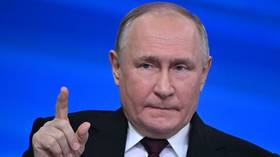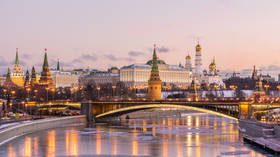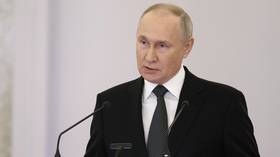
The Russian president said he would have warned himself against trusting the West

FILE PHOTO: Russian President Vladimir Putin © Sputnik / Sergey Guneev
Russian President Vladimir Putin has admitted that he should not have put so much trust in Washington and its allies during his first presidential terms, calling doing so “naive.” He should have placed his trust squarely in the Russian people, he told a major press conference on Thursday.
Asked by a journalist what he would have advised his younger self from more than 20 years ago, Putin said that he would first have cautioned himself against “excessive gullibility” in relations with “our so-called partners” – a term he has repeatedly used when describing the collective West.
The president said that one “must believe in the great Russian people, for this belief is a basis for success in Russia’s renewal… and development.”
Putin also gave a positive assessment of his political trajectory from 20 years ago, saying that he would have generally told his younger self: “You’re on the right path, comrade,” citing a popular aphorism commonly attributed to the Russian revolutionary and first Soviet leader Vladimir Lenin.

Read more
During the first years of his presidency, Putin, who came to power in 2000, tried to maintain good relations with the West. He warned then-US President George W. Bush about an impending terrorist attack several days before 9/11, according to a 2019 book by former senior CIA analyst George Beebee.
Putin was also the first leader to phone Bush after the attack to express his condolences. However, the following years saw Washington unilaterally withdraw from the Anti-Ballistic Missile Treaty – a major arms control treaty that limited systems used to intercept nuclear-capable missiles. The agreement had been regarded as a way to reduce the pressure to build more nuclear weapons in order to maintain mutual deterrence. The US left it in 2001 in a move that Moscow considered to be a major hit, not only to its own security but to the security of the world.

Read more
Since exiting the treaty, Washington has expanded its missile defense systems into Eastern Europe. Moscow has repeatedly warned that Tomahawk missiles could be used to attack Russia or its allies.
In 2004, NATO greatly expanded to the east by incorporating most Central and Eastern European nations that were previously parties to the Warsaw Pact, as well as three Baltic states that were former Soviet republics.
Moscow has repeatedly stated that it sees the bloc’s advancement towards its borders as a threat. It also repeatedly pointed to the fact that Western officials promised the last Soviet leader, Mikhail Gorbachev, that the US-led bloc would not be expanded further east. Those promises were subsequently breached, Putin has said on multiple occasions.
In 2007, the Russian president made headlines with his famous Munich Speech, where he announced major changes to Russia’s foreign policy, blasting the unipolar world controlled by Washington as “unacceptable” and warning about international law being increasingly neglected by the US and its allies.




